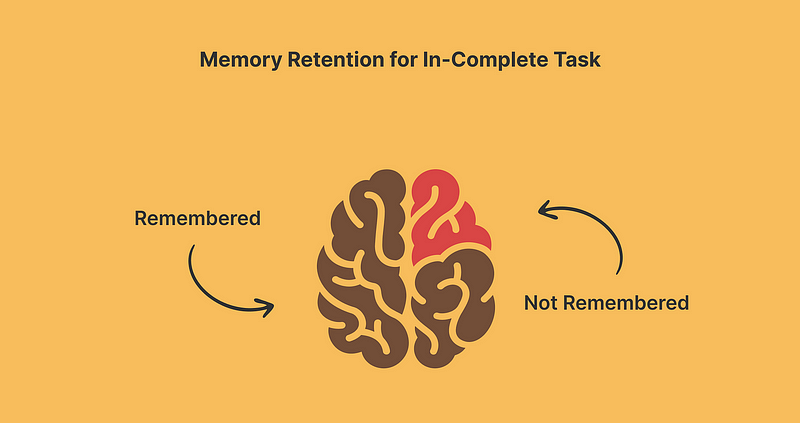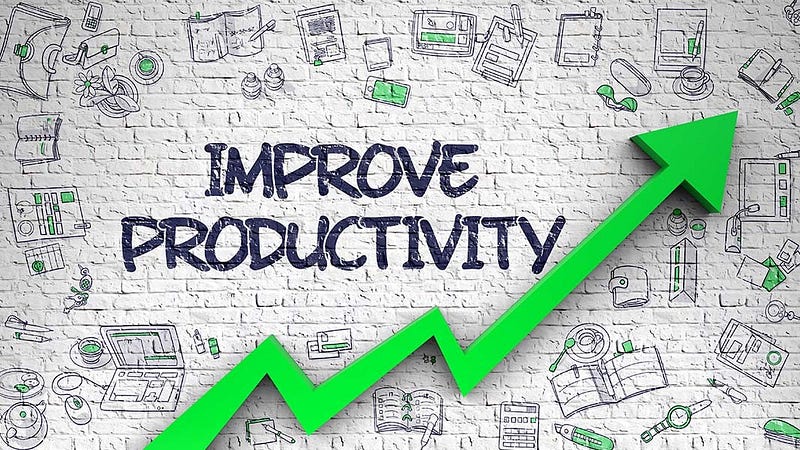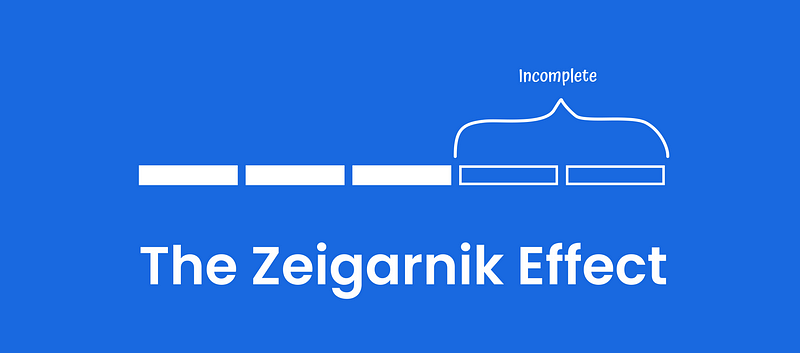The Zeigarnik Effect: Insights into Memory and Motivation
Written on
Understanding the Zeigarnik Effect
The Zeigarnik Effect, named after psychologist Bluma Zeigarnik, highlights how individuals tend to remember uncompleted or interrupted tasks more vividly than those that are finished. Zeigarnik's interest in this phenomenon arose when she noticed that waitstaff in cafés had a better recall of unfinished orders compared to completed ones. This observation led to numerous studies unveiling the implications of this effect across various facets of life.

Effects on Memory: The Power of Unfinished Tasks
Enhanced Memory for Incomplete Tasks:
A significant aspect of the Zeigarnik Effect is the improved memory associated with tasks that are not fully completed. This heightened awareness can manifest as persistent thoughts or reminders about unfinished work. Essentially, our brains tend to keep these "open loops" active, ensuring they remain prominent in our thoughts.
Reduced Memory for Completed Tasks:
On the other hand, tasks that have been completed often fade from memory more quickly. This suggests that our minds prioritize unresolved issues over those that have been addressed. While finishing tasks may provide satisfaction, it does not seem to leave a lasting impression, leading to a cognitive focus on ongoing matters.

Effects on Productivity: Motivation and Clutter
Increased Motivation:
The Zeigarnik Effect can serve as a strong motivational force. The presence of unfinished tasks often drives individuals to complete them, as the mind seeks closure. This desire can significantly enhance productivity, especially when clear goals and deadlines are established.
Procrastination and Mental Clutter:
However, while this effect can motivate, it can also lead to procrastination when the number of unfinished tasks becomes overwhelming. The mental disarray caused by too many open loops can hinder effective focus and prioritization. It is crucial to find a balance between harnessing this motivation and managing the chaos it can create.

Effects on Everyday Life: Intrusion and Engagement
Intrusive Thoughts and Distraction:
Unresolved tasks can lead to intrusive thoughts that distract us even during unrelated activities. The nagging sensation of an unfinished task can disrupt our ability to concentrate and enjoy peace of mind. This tendency to dwell on incomplete tasks can introduce unnecessary stress and tension.
Resonance in Storytelling:
The Zeigarnik Effect extends beyond daily tasks and is pivotal in storytelling. Authors and filmmakers often employ cliffhangers and unresolved plots to engage audiences. The anticipation for resolution creates suspense and emotional involvement, explaining our eagerness for the next chapter in a series or the sequel to a gripping movie.
Social Interactions:
This effect can also impact social relationships. When someone feels unresolved in a conversation or situation, it can lead to ongoing tension. Addressing these issues is essential for fostering healthier relationships and reducing lingering discomfort.

Managing the Zeigarnik Effect: Strategies for Balance
To effectively utilize the positive aspects of the Zeigarnik Effect while minimizing its drawbacks, consider these strategies:
Prioritize and Break Down Tasks:
Dividing tasks into smaller, manageable parts can lessen feelings of overwhelm and facilitate completion.
Set Clear Goals and Deadlines:
Establishing well-defined goals and deadlines can offer closure and lessen the persistence of unfinished tasks.
Utilize To-Do Lists and Management Tools:
Task management tools and to-do lists can help track responsibilities and provide a sense of achievement as tasks are completed.
Practice Mindfulness and Meditation:
Engaging in mindfulness and meditation can help quiet intrusive thoughts, enhancing focus and reducing mental clutter.

Conclusion: The Complexity of Unfinished Business
The Zeigarnik Effect is a captivating psychological concept that sheds light on how we deal with unfinished tasks and unresolved situations. By recognizing its implications for memory, productivity, and daily interactions, we can make more informed decisions on managing its influence. Whether leveraging the Zeigarnik Effect to boost motivation or taking steps to reduce distractions, understanding this phenomenon provides valuable insights into human behavior and thought processes.
Recognizing the dynamics of open loops in our minds can help us maintain a balance between productivity and mental clarity. It's not about avoiding unfinished tasks altogether, but rather about managing them in a way that transforms them into motivational drivers instead of barriers to our well-being. The Zeigarnik Effect illustrates the intricate relationship between memory, motivation, and the quest for closure in our everyday lives.
Chapter 2: The Zeigarnik Effect in Action
This video explores the Zeigarnik Effect and presents three pattern interrupts that can enhance conversion rates.
In this video, the role of the Zeigarnik Effect in relationships is discussed, highlighting its psychological impact on interpersonal connections.